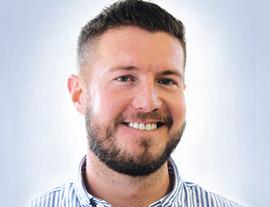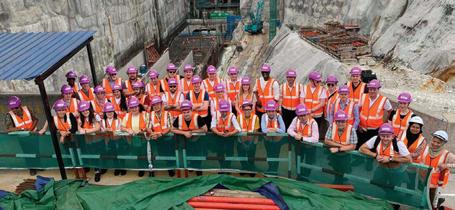
10 minute read
Profile Andrew Reynolds profile Interview with RLB’s new CEO
Profile
Advertisement
New Rider Levett Bucknall CEO Andrew Reynolds says a motivated workforce, armed with skills for a rapidly changing construction industry, is key to the consultant’s future. Neil Gerrard spoke to him
Independently owned consultant Rider Levett Bucknall (RLB) is dreaming big under the leadership of newly installed chief executive Andrew Reynolds.
Reynolds took the helm of the company late last year, at the same time that RLB announced it wanted to grow turnover to £150m over the next 10 years.
It has made a promising start. Profit at the firm more than doubled for the year to 30 April 2019, at £7.3m, while turnover rose to £81.7m, from £58.7m the year before.
Perhaps it all has something to do with RLB’s official company purpose, which is: “Have fun, feel valued, and make money, forever.” Reynolds admits that it sounds rather “fluffy” but there is a very serious intent behind it.
“For us, as a business that is 100% employee-owned, it means that it is very important that our employees feel that they are working in an environment where they are enjoying what they are doing and feeling valued, that they are being well rewarded, and they can see their career growing in the long term. “We really need to understand what value means to them. We believe that’s the starting point from which to build a great workforce,” he says.
Reynolds certainly seems to be a good example of the approach. Although only recently appointed chief executive, he has been with the business for 19 years. And in fact, more than 20% of the people working in the business have been employed by RLB for more than 10 years.
N o n e t h e l e s s, R e y n o l d s s e e s significant change on the horizon, not just in the way that the company operates as it grows, but also in the make-up of the workforce.
The skills that RLB needs are shifting as construction embraces its digital future, and Reynolds asserts that the main focus is currently on BIM and analytics. Its non-network digital team – those people not working within normal IT functions – is now more than 20 people, and RLB has just appointed its first chief digital officer in Matt Sharp.
“A n o r g a n i s a t i o n l i k e o u r s accumulates a huge wealth of data
Right: CEO Andrew Reynolds, appointed chief executive of RLB’s UK practice in November 2019
that we generate on behalf of our customers. And the challenge for a business like ours is how do we leverage that global dataset and turn it into intelligence for our clients? And how do we make sure that we have the skills that enable that to be done? So, we’ve certainly seen a bit of a shift in skills,” Reynolds says.
Similarly RLB is placing an increased emphasis on offsite construction, which ties into its commitments to sustainability and social value.
“For us, offsite manufacture is about making ethical, balanced decisions for our clients that can marry the uniqueness of offsite with the client need. And I think we are now starting to see some really good case studies that come with offsite,” says Reynolds. He admits that the UK is something of a latecomer to the offsite party and puts that down to a range of complex factors, including the client briefing process, the design and planning and procurement processes, as well as the maturity of supply chain.
“There’s a whole series of things that I think need a slightly different approach when you consider offsite. As we know, the industry suffers from fragmentation and to get the right skillset brought to each project with the relevant skills in this subject is always a challenge,” he says.
“But I think we will start to see skills move from the site to the manufacturing process and it will become more plug and play. So we see our skills shifting to offsite procurement and offsite contract management.”
Andy Reynolds on…
…quality and professionalism “The very DNA of our business is built around professional qualification. The route through skills in our business is degreelevel education and on to an organisation such as CIOB, RICS, APM. We encourage everyone to have a professional qualification. And importantly, what backs that up is the ethical standards that go with that qualification.”
…management style “Leadership isn’t about being in charge but is about taking care of those in your charge. Unfortunately, it's a phrase that's been in the press for a very sad reason recently but I've always found that being kind has always been a core ethic. If you encourage, give freedom and listen, I generally find that people shine.”
…Brexit “Traditionally, Europe for RL B was a series of alliances with independent organisations. What has changed for us is that we're now finding that our clients want to still contract with RLB from the UK as a lead. So for the first time we are registering businesses in Europe to enable us to continue our work with our clients and to contract in a slightly different way.”
40 %
By 2024, RLB aims for 40% of all staff to be female across its offices
Hand in hand with offsite goes sustainability, and RLB is currently in the process of moving its whole environmental approach to align with the United Nations’ (UN) Sustainable Development Goals.
“We see that as a really strong framework from which to adopt a common language and a common set of objectives for the world to address what is the biggest issue that faces us in modern times,” says Reynolds.
Repurpose and reuse In practical terms, that means reducing RLB’s own environmental impact, as well as changing how it advises clients. A key area there is looking at opportunities to repurpose or reuse buildings, rather than advising clients to rebuild them completely.
“We’ve seen some great case studies from clients now where they are truly embracing this and some very good results are being achieved,” says Reynolds. Finally, there is the standalone environmental advice and services that RLB can offer to its clients to help them make better decisions.
As far as RLB’s own progress on reducing its environmental impact is concerned, the outbreak of coronavirus is already putting some of the methods the company plans to use – for example, reduced business travel – to the test. “It’s a behavioural issue, as much as a policy issue,” says Reynolds. “We have put extensive plans for coronavirus in place like any business and it is testing our core beliefs. As an example, I am a global director within RLB and we only meet three times a year as a global board. We were due to have a meeting in Shanghai in February and we cancelled it and decided to do it on Skype. It actually worked really well. And it made us question whether we should just meet twice a year face to face.
Andy Reynolds CV
l 1996: Graduated from University of Salford with a BSc (Hons) degree in Quantity Surveying; joined Gardiner & Theobald as a graduate surveyor
l 2001: Joined RLB as a senior surveyor
l 2005-6: Appointed UK head of retail
l 2008: Role extended to oversee the European business l 2010: Oversaw the project, cost and health & safety management for the overlay element of London Olympics 2012
l 2014: Appointed to the RLB UK board of directors
l 2015: Appointed to the RLB global board of directors
l 2019: Appointed chief executive of RLB’s UK practice
“Sometimes there are these odd moments of positive challenge that get us to rethink how we approach things.” Another major area where RLB is having a rethink is on diversity and inclusion (D&I). The company has introduced a D&I steering and implementation group in a bid to boost the number of women and ethnic minorities within its business.
By 2024, the business aims for 40% of all its staff to be female across its offices, with 20% of senior positions filled by women by 2022. In 2019, 30% of the workforce was female. Meanwhile, it aims for all of its offices to be within 10% of their local ethnicity mix by 2022.
To help achieve that, the company has put thought into making its recruitment process as inclusive as possible, with all staff who undertake recruitment undergoing D&I training on areas like unconscious bias, as well as making recruitment panels more reflective of the workforce.
“There is a lot of work going on in this area, and ultimately, I think it is about how we celebrate people professionally and personally. One of the key challenges for D&I is to give everyone the appropriate level of voice and to make sure that voice is heard,” says Reynolds.
Building relationships While some of the challenges that RLB faces as it continues on its path to doubling in size may be novel, Reynolds concludes by citing the tried and trusted advice that his father gave to him as he set out on his career. “On my first day of work, at the age of 17, he told me: ‘Never overlook the small details, treat everybody equally, and finally – it’s a small industry so always build relationships very positively.’ Those are three things that I have lived by.” ●
DIGITAL TRANSFORMATION – OVERCOMING CULTURAL AND BEHAVIOURAL BARRIERS






Markup
Digital Transformation is a huge opportunity for the AEC industry that has struggled for decades with low productivity and low profi tability. Fully embedding digital tools into business as usual off ers a way out of this trap. However, many companies are struggling to make the most of existing products and few are on top of the possibilities created by emerging technologies.
What can engineering and construction fi rms do to accelerate adoption?
Focus on digital leadership The industry is not making the most of the technology available because of unawareness about what it can do. At the same time, when technology is deployed it can fail to deliver its potential because of a lack of fi t with existing processes and ways of working – or its eff ectiveness is undermined by the existence of out of date legacy IT systems. Chief technology offi cers or chief digital offi cers are an increasing presence in engineering and construction fi rms. This trend does point to the industry acknowledging that digital transformation is both an organisational change issue and a technology issue. Now is the time for more organisations to consider if they have the personnel in place to deliver digital leadership.
What can be done at the industry level?
Use technology to develop new business models We have already seen that E&C fi rms typically struggle with low margins. This inevitably reduces the appetite to invest in technology and the human capabilities needed to exploit them. Digital transformation does point to a way out of this trap. Digital tools combined with increased volumes of data mean consultants and contractors know more about the assets they design and build than ever before. This insight can be the basis for new business models in which fi rms are rewarded for the value they deliver to their clients, rather than the inputs they put into projects.
Establish industry standards and improve interoperability Volumes of data are generated in diff erent formats via a multiplicity of incompatible systems. This is as a barrier to unlocking the benefi ts of digital transformation. One size will never fi t all but establishing industry standards and improving interoperability would be a big step forward. If industry players can agree to a basic framework, opportunities to develop scalable products and services could be huge.
Read the full report created in collaboration with the Institution of Civil Engineers for more insights. go.bluebeam.com/tech-adoption-uk










